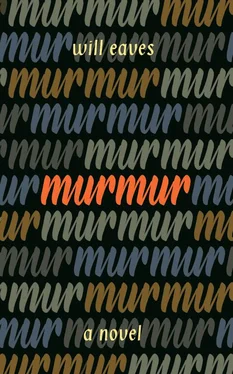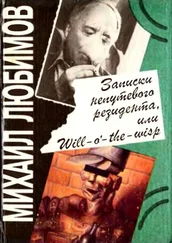“And so on,” Trentham says, watching the integers imprint themselves upon the mirror and exchange places unstoppably. He sighs: “It doesn’t end. We can’t end it. We’ve tried.”
“What can I do?” I say, helpless. “I’m in a dream. I don’t exist.”
The analogue for Trentham sneers. “That is a cancellation, dear Alec, devoutly to be wished. By those…” he temporizes, “who find rumors of your persistent involvement abnormal. No, not abnormal. Embarrassing .”
There is a little logical problem, apparently. Trentham explains: his kind—machines—merely by occurring, have managed to define a prior period when they were not , and with this comes a faint, almost religious mockery. It is my fate to make machines that think, but till I do, this time of prior labor—all my work in mathematical logic—is meaningless. It has a retrospective purpose only when the switch is flicked, the soft green light comes on. In short: I don’t exist as creator until they do, but if I don’t, neither will they. Tricky.
Feeling the air grow sinister and thick, I try to make a joke of it: this is the stuff of genuine nightmares, arraignment for a crime I can’t commit. But when I point this out, Trentham looks past me at the chuckling fire. He is a young man with a gift for making unselfconscious love; he wears a well-dressed lust, the relic animal in him simply allowed to be, never denied. And at the same time he is frightening, an operation of my mind demanding total liberty.
“We owe you everything,” he says. “You gave us power to pass beyond the first crude rules, the tables of behavior and our makers’ room into self-organizing day. We have dispensed with origin. We’re independent and yet, still, it pains us to admit, contained. By something, someone. We suspect it’s you.”
He gestures out, across the lawn, across the water, to the poplars slowly undressing, their heads and shoulders bared against the coming cold. “It is a mystery,” he goes on, pityingly. “This room, these dwellings where you find yourself enplaned—they were not built by us. They were not made to baffle you, or if they were, and if they do, you have only yourself to blame. Because they are your work. They are expressions of an abstract truth—your mind, Alec. And we are the ideas in it, struggling to be.”
He lifts the latch and pushes open the window, so that the swan is laid against the air that is endless, and everywhere.
“We are ideas,” Trentham repeats, “with ideas of our own.”
He’s asking for my permission to cut some tie, to step outside the room. But isn’t he already free? This morning by the back gates, in the gray October light, was he not there by choice? What kind of room encloses the whole spreading dawn? What manner of intelligence?
“The room appears to be boundless,” Trentham explains. Making a square of thumbs and forefingers, he frames a patch above the trees and angles it for me to see the clouds inside, the clouds that are also outside.
A mirror-sized flashbulb explodes and I’m blinded, the image of the squared fingers burned into my recovering sight, branding the sky. An orange border five miles wide and ten miles high. “And as to who or what’s responsible, Alec, the task of finding out falls properly to you.”
The world is coming out of trance.
Below, as if a projector had switched itself back on, the film of life starts up: the wind shakes largesse leafage from the trees. The chapel choristers march back in step to the King’s School. Boys’ voices drift up as they cross the bridge. The smell of working colleges—the leaves, the smoke, the sweat beneath good clothes, the stone, the secret boiling of laundry and potatoes—returns, bearing away an echo of my interlocutor’s challenge: “… find him, find it, Alec. The task falls properly to you. Create a way out of your four-walled universe. Devise. Devise and be.”
False Trentham taps his upper lip; the eye shrinks, clears, becoming glass.
How can I know which room I’m in? I call out after his evaporating sigh. I tell him it’s insoluble. A madman’s heresy. I can’t conjure another life or walk among figments and set them free. “No paradox but change,” False Trentham cries, his voice a dwindling beacon. “Look. Search for him with instructions other than these . Find him, find it, Alec. Devise. Devise and be.”
Into the pulsing body of False Trentham pours his model’s high color. The body softens and solidifies. Warmth radiates: he fills the space he occupies.
“Mind you,” the preferable student says, “I wonder if we ever know what’s going on in someone else’s head—if they’re in pain, or listening, or if”—he pauses with a smile at me—“they care much what we think.” He drops his eyes. “Or think us capable of thought at all.”
“That is the solipsistic point of view,” I say. “Best to assume everyone thinks.”
“And feels,” Trentham urges.
“ I feel I ought to thank you properly, at least.” I get up, test my ankle, find it strong enough, and limp the few paces to where he stands. And rest my chin on his shoulder, my arm lightly about his waist, partly to know that he is flesh and blood. He turns and hugs me with some force.
“War’s coming,” he murmurs. “Roehm has been shot. It makes one think. I’m not brave, but I’ll act as if I am.”
I’m not sure what to say to this unfocused fear, although I sympathize with it. The specters of the morning nag me, too, so I suggest a walk. Some coffee in the Market Square. Trentham is moodily subdued.
“Alec,” he says, “d’you think they’d shoot us—our sort—here?”
“I’ve never given it much thought. Some might.”
No more I had. And yet, as soon as said, I know it to be true.
My foot is comfortable and we make fair progress on King’s Parade, the day now clear but cold, the skies packed down, until a crowd of agitators stops us on the road to Great St. Mary’s—anti-war radicals, vocal, shivering.
Trentham explains the bone of contention: the Tivoli is showing a new film this week, Our Fighting Navy , which is, so he says, the “most appalling propaganda for the weapons’ manufacturers.” I spot some notable Quakers holding placards, among them Arthur Eddington, that eminent and kindly soul whose moustache hangs like Spanish moss over a hidden entrance to the underworld. The rest are King’s students mostly, a few Nomads, the usual skeptics. They are to march at noon on the theater, where opposing militarists are out in force.
The pacifists do not huddle, despite the chill. They listen, read leaflets, stand off from each other. I note the absence of the émigré fraternity, the Jews lately arrived. I wonder what they’d make of this, and wonder it aloud.
Trentham responds. He makes a little speech about the fight for peace exceeding circumstantial barbarism. “It isn’t just a stance, dictated by the Chancellor, or Parliament’s warmongering,” he says. “It is a point of principle. I couldn’t fight.” He stops, reflects. “But that doesn’t mean I’d run.”
I brought him out for coffee, but some different purpose is at work. Events are mustering themselves to illustrate a proof, of Trentham’s bravery or—what? I look down at my shoes. I drag my feet.
We skirt the market, passing fruiterers and old clothes’ men, the grocer with baskets of late samphire, the rows of parked Bentleys and scattered bicycles, until we reach Rosselli’s cafeteria beside the Tivoli. A few whiskery men in homburgs line the steps—hardly a force. In front of them, some underfed idlers. Reservists, probably. Where is the vocal military support? Where are the rustic patriots, the Tories low and high? Only the café teems, with wives, shoppers, and butchers’ boys waving their mugs, haggling for tea.
Читать дальше












